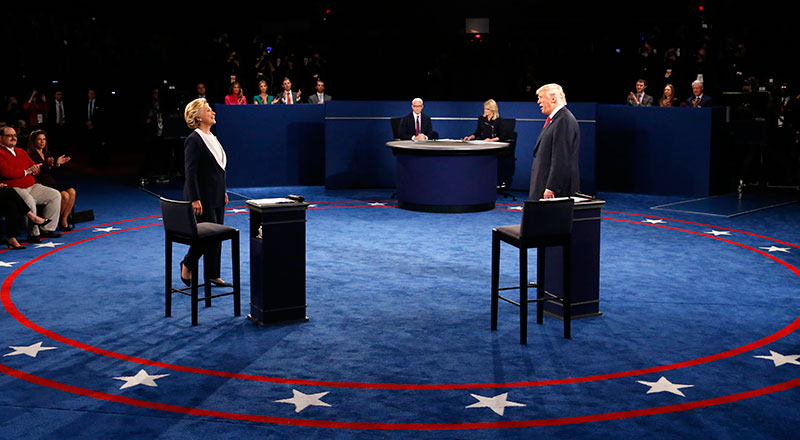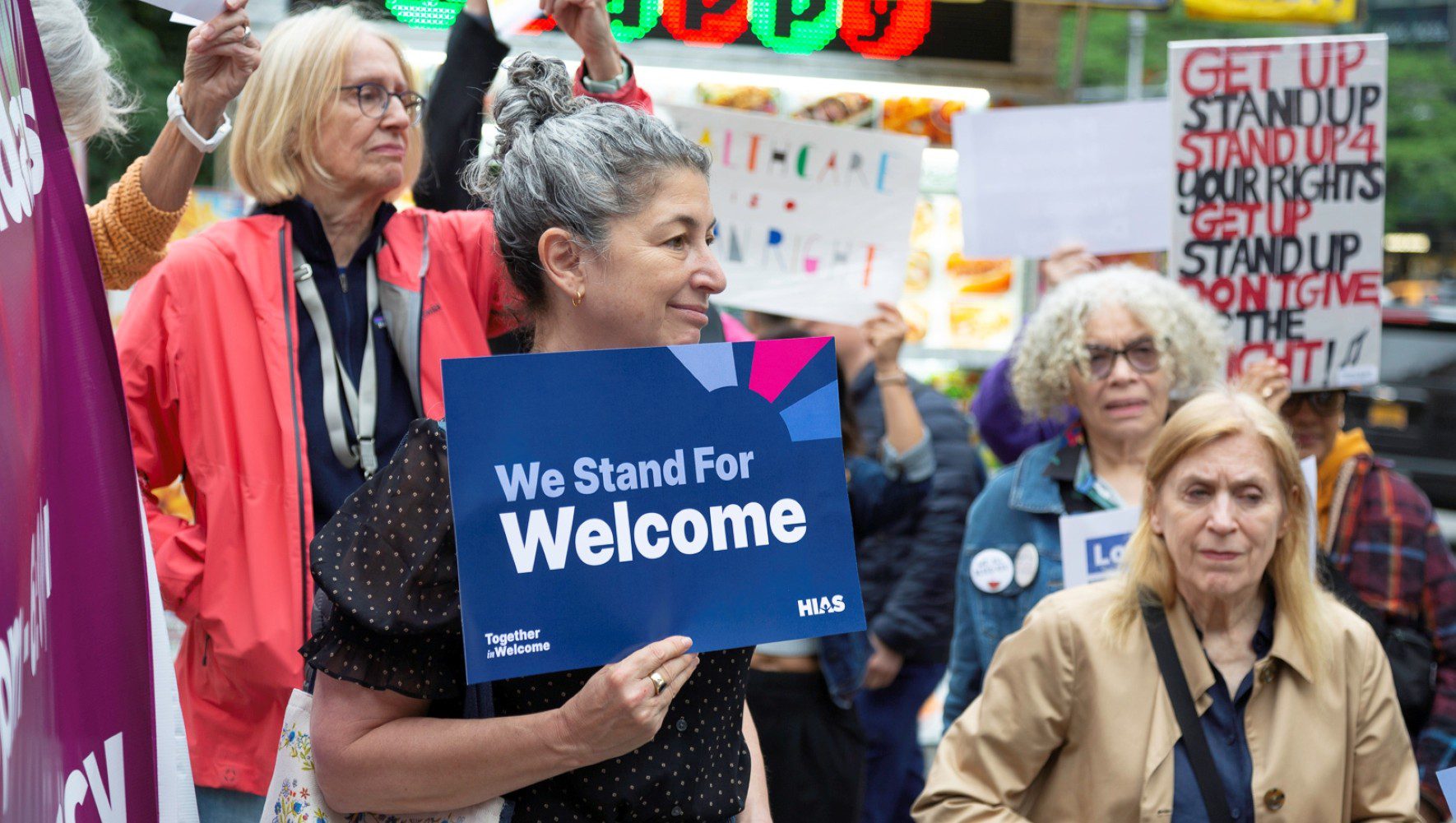What You Should Know When Candidates Talk About Refugees
Oct 10, 2016

Democratic nominee Hillary Clinton (L) and Republican nominee Donald Trump arrive on stage during the second presidential debate at Washington University in St. Louis, Missouri on October 9, 2016.
(Jim Bourg/AFP/Getty Images)
For the first time in recent history, the global refugee crisis has been at the forefront of the discourse related to a presidential election.
What the United States should be doing to help the more than 65 million people displaced by conflict, especially those fleeing the war in Syria, has been a widely discussed topic throughout the campaign, and was mentioned during both the recent presidential and vice presidential debates.
Normally, the added attention to this massive humanitarian issue would be a welcome development in the refugee resettlement community. However, within the current political landscape, the level of misinformation, combined with dispirited leadership in response to the refugee crisis, is a major cause for concern.
Following the second presidential debate, in which Republican candidate Donald J. Trump said of refugees, “People are coming into our country like we have no idea who they are, where they are from, what their feelings about our country is,” we felt it was necessary to set the record straight on some crucial points.
The United States Has Proudly Resettled Refugees For Decades
The US should be proud of its long legacy of welcoming refugees fleeing conflict and violence. #VPDebate #refugeeswelcome
— HIAS (@HIASrefugees) October 5, 2016
The U.S. has a long, proud tradition of resettling refugees from all over the world, including Syrians fleeing the deadly civil war in their country. The notion of the United States welcoming people who have been forced to leave their entire lives behind simply in search of safety is not a new phenomenon.
"Give me your tired, your poor, your huddled masses yearning to breathe free," part of a poem (written by HIAS-resettled refugee Emma Lazarus) inscribed on the Statue of Liberty, is known by nearly every American, and up until very recently, the U.S. refugee resettlement program was touted by both Democrats and Republicans alike as a beacon of our democracy.
Refugees Are FLEEING Terror
FACT: #Refugees are screened by @DHSgov, @StateDept, @FBI and the Nat’l Counterterrorism Center before they ever set foot in the US. #debate
— HIAS (@HIASrefugees) October 10, 2016
When Indiana Governor Mike Pence said in the vice presidential debate that, “two Syrian refugees were involved in the attack in Paris,” he perpetuated a falsehood--the Paris attackers were European nationals.
Washington Post reporter Ishaan Tharoor notes in a recent article, “As much as Trump, Pence and other Republican officials invoke Europe's security concerns, the analogy doesn't work…the United States, thousands of miles away, is not victim to this geography and can take in refugees through a much more careful and deliberate process.”
The truth is, the U.S. Refugee Program includes extensive security vetting from five government agencies. Refugees are screened at higher levels than any other entrants to the country, including students and tourists. More importantly, refugees, by definition, are the victims of violence, not its perpetrators. A recent study by the Cato Institute calculated that “the chance of an American being murdered in a terrorist attack caused by a refugee is 1 in 3.64 billion per year.”
The United States Can And Should Be Doing More To Help Refugees
With 1 human in every 113 affected, forced displacement has hit a record high https://t.co/gKGNf7P5Tq pic.twitter.com/c9OES9tNpw
— UN Refugee Agency (@Refugees) October 6, 2016
Democratic presidential candidate Hillary Clinton said in the second debate, “We need to do our part. We by no means are carrying anywhere near the load that Europe and others are,” and that’s true. Clinton has advocated that the United States take in 65,000 Syrian refugees in the coming year, not “hundreds of thousands,” as Trump claimed in the debate.
Clinton's proposed number is also too small compared to the size of the crisis and the number of reufgees smaller countries are taking in. In fact, the U.S. has taken in more refugees during less severe refugee crises, such as when the United States took in over 200,000 refugees in 1981.
The Washington Post pointed out that 12,500 Syrian refugees have been admitted to the U.S. in the past year, less than one-half the number accepted by Canada and “higher than the goal President Obama set of 10,000 refugees.”
President Obama’s commitment to resettle 110,000 refugees this year is a positive and much needed-step, but in the midst of the greatest displacement crisis in recorded history, even bolder steps are required. HIAS is calling on the United States to commit to protecting 200,000 refugees in the coming year.
Refugees Contribute To Society
President Obama at the UN: "I believe refugees can make us stronger" https://t.co/6OZtrfIwim https://t.co/UgxisegHWf
— CNN Politics (@CNNPolitics) September 20, 2016
As President Obama noted during his opening remarks at the Leaders’ Summit on the Global Refugee Crisis last month, “We’ve seen in America hardworking, patriotic refugees serve in our military, start new businesses and help revitalize communities. I believe refugees can make us stronger.”
From Secretary of State Madeleine Albright, to Albert Einstein, to Google co-founder Sergey Brin, our history has shown us over and over again the positive contributions refugees make in our communities.
In addition to the ways refugees strengthen our communities, including opening small businesses and enriching our cultural experiences, welcoming refugees empowers us to act on our values.
During a recent Senate hearing on the U.S. refugee resettlement program, Senator Al Franken (D-MN) reminded the committee, “I just think that this is really a matter of values when you come right down to it, and I think our country is enriched by refugees like my grandfather. I think we have to do a gut check here, and see who we are as a people.”
Add your name to the growing number of Americans who want to keep the gates open for refugees, and sign up today to receive regular updates about HIAS’ work on behalf of the world’s most vulnerable refugees and asylum seekers.


